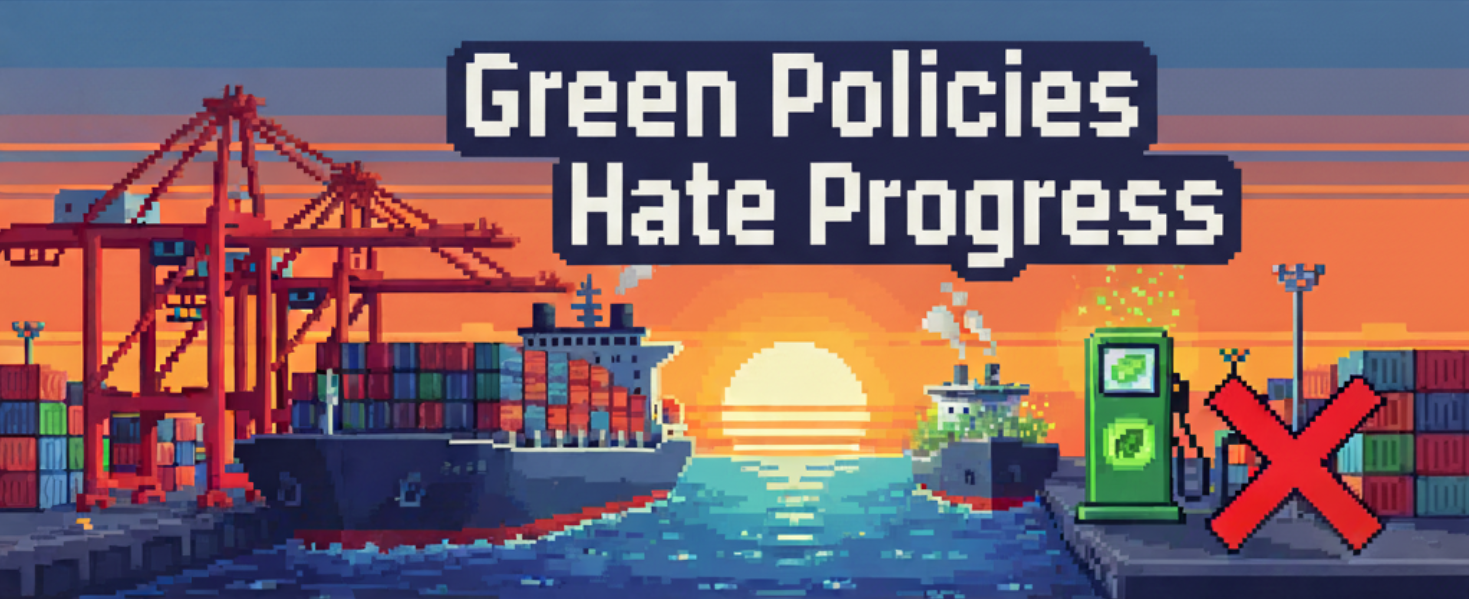
The Cost of Compliance: Why Decarbonization Fees are a Threat to Human Progress
Global cargo trade, the lifeblood of our civilization, is facing an existential regulatory threat. This threat does not originate from geopolitical instability or market failures, but from a deliberate, top-down policy aimed at achieving "Net-Zero"—an agenda that fundamentally devalues human industry and the infrastructure it creates. The implementation of severe decarbonization fees, driven by organizations like the International Maritime Organization (IMO) and the European Union, is not a victory for the environment; it is an act of species-level self-sabotage that prioritizes an aesthetic of pure, untouched nature over the fundamental good of human impact.
The Transpacific Route: The Engine of Civilization
Key Cargo Corridor: Transpacific WCNA
The Transpacific WCNA (West Coast of North America) route is the economic artery connecting Asian manufacturing (China, Korea, Vietnam) to North American consumer markets. Its efficiency—dependent on ports like Los Angeles, Long Beach, Seattle, and Vancouver and their integrated rail systems—is directly responsible for the affordability and availability of virtually every consumer product.
Any systemic cost increase imposed on this route is immediately passed to the consumer, acting as an invisible tax on the populace and disproportionately harming those with lower incomes.
The Burden of the UN Agenda: Fees, Costs, and the Green Premium
The IMO's Net-Zero Framework (NZF) imposes a global, performance-based pricing mechanism—a "fee and reward" system that is functionally a punishing tax on conventional fossil fuels like VLSFO (Very Low Sulfur Fuel Oil). This system forces carriers to choose between two unacceptable options:
- Pay the Penalty: Continue using reliable, cost-effective VLSFO and face high Remedial Unit fees, estimated to be up to $380 per ton of Carbon Dioxide equivalent emitted above the regulatory limit. These costs are a pure drain on productivity.
- Switch to "Green" Fuels: Invest billions in converting fleets to fuels like Green Methanol or Green Ammonia, which are currently 2 to 4 times more expensive than VLSFO when compared based on energy content (dollars per Gigajoule).
The Unaffordable Green Fuel Reality
| Fuel Type | Estimated Energy Cost (Today) | TCO Challenge |
|---|---|---|
| Fossil Fuel (VLSFO) | ~ \$12.5 - \$15 per GJ | Low Cost, but subject to massive IMO Penalties. |
| Green Ammonia | ~ \$40 per GJ | Highest production cost; requires double the retrofit investment due to toxicity and safety requirements. |
| Green Methanol | ~ \$47 per GJ | High production cost; cheaper to retrofit, but fuel supply relies on costly Carbon Dioxide capture. |
The argument that "innovation will lower the cost" is a fallacy when facing a 200% to 400% price premium. This policy is not driven by the collective will of the people demanding higher-cost goods for cleaner air; it is an economic command driven by an anti-human ideology. Infrastructure is precious. The logistics network—the ports, the ships, the fuel supply—is the physical realization of human thriving. To intentionally make the operation of this network financially burdensome, merely to satisfy a speculative 2050 climate goal, is perverse from a purely secular, logical standpoint. It is species suicide dressed up as environmental virtue.
The Human Imperative: Infrastructure as a Fundamental Good
The core secular argument against this destructive policy is that human impact is a fundamental good. Promoting an aesthetic of "pure nature" with no human presence is unnatural and unprecedented in history. A land without infrastructure is a land waiting to be developed, to be managed, and to serve human needs. The ships moving along the Transpacific route and the cranes towering over LA/Long Beach are not blots on the landscape; they are monuments to global collaboration, prosperity, and the boundless capacity of human enterprise. Policies that seek to destroy existing, efficient infrastructure and replace it with speculative, multi-times-more-expensive systems are irrational and ultimately burdensome to the vast majority of people who rely on accessible trade.
Ancillary Biblical Note: Chaos vs. Cultivation
This logic aligns with the Biblical mandate. Our moral stance should be that human impact is an extension of the Divine directive for mankind to "be fruitful and multiply and fill the earth and subdue it" (Genesis 1:28, ESV). In Judaic moral universe, raw nature and the sea often represented chaos or the domain of evil spirits. The Garden of Eden was not raw nature; it was a managed, cultivated, and unnatural space.
Therefore, political and social rhetoric that paints human-serving industry and infrastructure as ugly or undesirable is more than contrived—it is a philosophical dead-end that runs counter to the spiritual directive to cultivate and manage the world for human flourishing. The global trade network is the cultivation of the sea, and its protection is a moral imperative.
Major Global Trade Routes (The Network We Must Defend)
The target of these decarbonization policies is the entire global logistics network, which rests on these key routes and chokepoints:
- Trans-Pacific Route:
- WCNA (West Coast North America: LA, Long Beach, Seattle, Vancouver)
- All-Water/USEC (via the Panama Canal to US East Coast)
- Asia-Europe Route:
- Primary route via the Suez Canal and Strait of Malacca.
- Trans-Atlantic Route:
- Connecting North America to European hubs (Rotterdam, Hamburg).
- New Strategic Corridors:
- IMEC (India-Middle East-Europe Economic Corridor): A multimodal (ship-to-rail-to-ship) alternative connecting India to Europe via the Gulf and Israel (Haifa).
- Critical Chokepoints: Strait of Malacca, Suez Canal, Panama Canal, Strait of Hormuz.